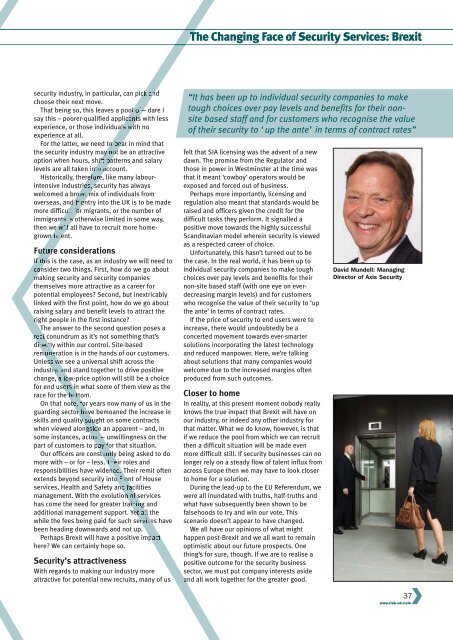RiskUKSeptember2017
You also want an ePaper? Increase the reach of your titles
YUMPU automatically turns print PDFs into web optimized ePapers that Google loves.
The Changing Face of Security Services: Brexit<br />
security industry, in particular, can pick and<br />
choose their next move.<br />
That being so, this leaves a pool of – dare I<br />
say this – poorer-qualified applicants with less<br />
experience, or those individuals with no<br />
experience at all.<br />
For the latter, we need to bear in mind that<br />
the security industry may not be an attractive<br />
option when hours, shift patterns and salary<br />
levels are all taken into account.<br />
Historically, therefore, like many labourintensive<br />
industries, security has always<br />
welcomed a broad mix of individuals from<br />
overseas, and if entry into the UK is to be made<br />
more difficult for migrants, or the number of<br />
immigrants is otherwise limited in some way,<br />
then we will all have to recruit more homegrown<br />
talent.<br />
Future considerations<br />
If this is the case, as an industry we will need to<br />
consider two things. First, how do we go about<br />
making security and security companies<br />
themselves more attractive as a career for<br />
potential employees? Second, but inextricably<br />
linked with the first point, how do we go about<br />
raising salary and benefit levels to attract the<br />
right people in the first instance?<br />
The answer to the second question poses a<br />
real conundrum as it’s not something that’s<br />
directly within our control. Site-based<br />
remuneration is in the hands of our customers.<br />
Unless we see a universal shift across the<br />
industry, and stand together to drive positive<br />
change, a low-price option will still be a choice<br />
for end users in what some of them view as the<br />
race for the bottom.<br />
On that note, for years now many of us in the<br />
guarding sector have bemoaned the increase in<br />
skills and quality sought on some contracts<br />
when viewed alongside an apparent – and, in<br />
some instances, actual – unwillingness on the<br />
part of customers to pay for that situation.<br />
Our officers are constantly being asked to do<br />
more with – or for – less. Their roles and<br />
responsibilities have widened. Their remit often<br />
extends beyond security into Front of House<br />
services, Health and Safety and facilities<br />
management. With the evolution of services<br />
has come the need for greater training and<br />
additional management support. Yet all the<br />
while the fees being paid for such services have<br />
been heading downwards and not up.<br />
Perhaps Brexit will have a positive impact<br />
here? We can certainly hope so.<br />
Security’s attractiveness<br />
With regards to making our industry more<br />
attractive for potential new recruits, many of us<br />
“It has been up to individual security companies to make<br />
tough choices over pay levels and benefits for their nonsite<br />
based staff and for customers who recognise the value<br />
of their security to ‘up the ante’ in terms of contract rates”<br />
felt that SIA licensing was the advent of a new<br />
dawn. The promise from the Regulator and<br />
those in power in Westminster at the time was<br />
that it meant ‘cowboy’ operators would be<br />
exposed and forced out of business.<br />
Perhaps more importantly, licensing and<br />
regulation also meant that standards would be<br />
raised and officers given the credit for the<br />
difficult tasks they perform. It signalled a<br />
positive move towards the highly successful<br />
Scandinavian model wherein security is viewed<br />
as a respected career of choice.<br />
Unfortunately, this hasn’t turned out to be<br />
the case. In the real world, it has been up to<br />
individual security companies to make tough<br />
choices over pay levels and benefits for their<br />
non-site based staff (with one eye on everdecreasing<br />
margin levels) and for customers<br />
who recognise the value of their security to ‘up<br />
the ante’ in terms of contract rates.<br />
If the price of security to end users were to<br />
increase, there would undoubtedly be a<br />
concerted movement towards ever-smarter<br />
solutions incorporating the latest technology<br />
and reduced manpower. Here, we’re talking<br />
about solutions that many companies would<br />
welcome due to the increased margins often<br />
produced from such outcomes.<br />
Closer to home<br />
In reality, at this present moment nobody really<br />
knows the true impact that Brexit will have on<br />
our industry, or indeed any other industry for<br />
that matter. What we do know, however, is that<br />
if we reduce the pool from which we can recruit<br />
then a difficult situation will be made even<br />
more difficult still. If security businesses can no<br />
longer rely on a steady flow of talent influx from<br />
across Europe then we may have to look closer<br />
to home for a solution.<br />
During the lead-up to the EU Referendum, we<br />
were all inundated with truths, half-truths and<br />
what have subsequently been shown to be<br />
falsehoods to try and win our vote. This<br />
scenario doesn’t appear to have changed.<br />
We all have our opinions of what might<br />
happen post-Brexit and we all want to remain<br />
optimistic about our future prospects. One<br />
thing’s for sure, though. If we are to realise a<br />
positive outcome for the security business<br />
sector, we must put company interests aside<br />
and all work together for the greater good.<br />
David Mundell: Managing<br />
Director of Axis Security<br />
37<br />
www.risk-uk.com

















